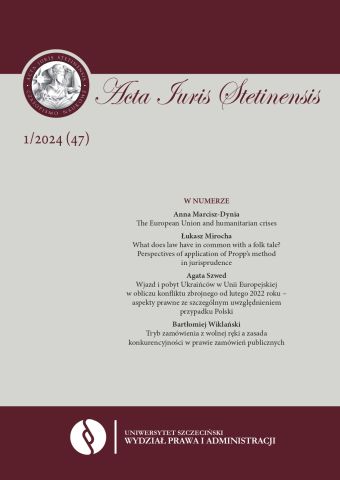Cooperation and interoperability between public security services and medical service in the aspect of CBRN threats in the territory of the Republic of Poland
Cooperation and interoperability between public security services and medical service in the aspect of CBRN threats in the territory of the Republic of Poland
Author(s): Marcin Krzysztof KoniecznySubject(s): Politics / Political Sciences, Politics, Law, Constitution, Jurisprudence, Criminal Law, Security and defense, Administrative Law
Published by: Wydawnictwo Naukowe Uniwersytetu Szczecińskiego
Keywords: public security; public security services; medical entities; CBRN threats
Summary/Abstract: The article deals with the issue of cooperation and interoperability between the services responsible for public security and medical entities, including emergency medical units. The topic seems interesting due to the growing problem of threats resulting from a possible use of CBRN agents. As a general rule, toxic chemicals, pathogens of all kinds, and radioactive and nuclear substances can get out of control at random, but they can also be used deliberately – in terrorist attacks. Regardless of the cause, they pose a serious threat to life and health, as well as to the environment. The author puts forward the thesis that in the context of this type of threat, cooperation between the entities designated to save lives and health is insufficient and it absolutely requires the implementation of methods ensuring better coordination of activities. Based on the available relevant literature, the article describes the concepts of public security, health safety and threats. The aim of the study is to analyze common training, methods and systems of cooperation between services responsible for public security, in particular the principles of notifying and informing about threats related to the possible use of CBRN, particularly in terms of preventing such threats, responding to them, counteracting and taking relevant protective measures. The article addresses the issue of the duties, scope of responsibility and competences of individual formations in the light of legal regulations in force. It also addresses the unresolved issue of insufficient coordination and the deficit in the area of rapid information exchange. The study indicates solutions and recommendations that could fill this gap for the benefit of public security and state authorities. The research method adopted for the purposes of this study is the analysis of the relevant literature.
Journal: Acta Iuris Stetinensis
- Issue Year: 2024
- Issue No: 47 (1)
- Page Range: 9-23
- Page Count: 15
- Language: English

